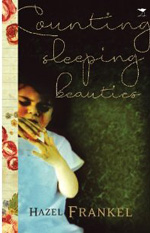
Hannah has never known any kind of affection from her mother, Susan. So when Sina joins the Kramer family as a domestic worker, the child instantly latches on to her for love and attention. She also dotes on her grandmother, her Bobba, spending lots of time in the company of the older woman, Leah, combing her hair and listening to stories of her life in the shtetl in Lithuania.
The setting is the 1950s in Johannesburg, primarily in the Stone House inhabited by Nathan and Susan, Hannah's parents, and Morris and Leah, her maternal grandparents. The story unfolds via the voices of four women: Leah, Susan, Sina, and Hannah, who have remarkably different perspectives.
The older, frail Leah is Jewish and learned English in her latter years. Her conversation (and the book) is liberally sprinkled with Yiddish, and the child often innocently interrupts her with the likes of, "Bobba, you mustn't say perrhaps. It's perhaps. Don't you know?"
Susan is a repressed housewife and ineffective mother, given to fits of loneliness and depression. Sina, in turn, is a black woman with her own very compelling tale of love and loss. She has had to leave her family and village to find work to make ends meet back home. There were some enjoyable portions about life in the African township with her daughter, Matlina. As a result of Sina's maternal instincts, the connection between her and Hannah is a special one that endures.
And Hannah, though she is dearly loved by her father and grandparents, sadly lacks her mother's affection or interest. As a result, she inhabits an internal childlike world populated by dolls, and charms, which she refers to as "sleeping beauties", and to which she ascribes undue importance and repeatedly counts and tracks whilst playing, hence the title of the book.
One day this relatively normal and functioning family is hit by a devastating tragedy. But no one talks about it, and very soon everything is falling apart around them. Every single person in the family pulls into his or her own corner, and as the deafening silence takes hold, the poor child is left with too many unanswered questions, and a huge sense of lingering guilt.
Notwithstanding a handful of odd errors in the text—which one hopes will be removed in a second printing—this was a good, if sad, read. Frankel gradually builds the story to a climax but once the turning-point is reached, the book sustains a momentum that keeps one going right through till the end.
The book highlights the significance of love and family connections. One sees the affection
and enjoyment this family was capable of before their utterly distressing and dreadful loss.
It also underlines the importance of communication between loved ones, and how a lack thereof
can break one's spirit and cause lives to unravel. This was an enlightening, if somewhat
jarring read.

Jacana Media, paperback, 9781770095441
